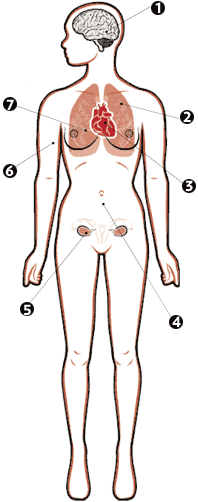Antonio Gotto Jr., Paul Nurse, and Harold Varmus
Dean, Weill Medical College of Cornell University; president, Rockefeller University; president and CEO, Memorial Sloan-Kettering Cancer Center
The team that’s keeping the city competitive in the critical stem-cell-research game. As the leaders of the three institutions that make up the Tri-Institutional Stem Cell Initiative, Gotto, Nurse, and Varmus have managed to keep many of the field’s best scientists here and recruit others, at a time when New York is facing stiff competition for talent from states like California that have made stem-cell research a top priority. Last year, the Tri-Institutional coalition received a $50 million grant from the Starr Foundation that will help them collaborate on studies that could decode the regenerating power of stem cells and potentially lead to cures for diseases like diabetes, Parkinson’s, and cancer.
Dr. Thomas Frieden
Commissioner, New York Department of Health and Mental Hygiene
Today, New York has 200,000 fewer smokers than it did four years ago as a result of Tom Frieden’s advocacy. Mayor Bloomberg, of course, deserves credit for making the issue a priority—and also for hiring Frieden. According to reports, Frieden secured a promise from the mayor to support his hard-line take on smoking before he took the job. Among Frieden’s next quests: He wants to tackle New York’s growing obesity problem.
Madelyn Gould, Maria A. Oquendo, and Kelly Posner
Research scientists, Columbia University Medical Center
When an FDA panel convened to discuss the possible fatal side effects of prescribing antidepressants to teens—evidence was emerging that the drugs caused an increased likelihood of suicide—they were stymied by how to accurately classify which behaviors were true signs of suicidal tendencies and which were not. Without a clear answer, the project couldn’t go forward. Gould, Oquendo, and Posner broke the logjam by creating standards for defining “suicidal behavior.” That led to the placement of “black-box” warnings, the most serious FDA alert, on antidepressant labels and a heightened awareness of the effects of potent drugs on children. The same standards can now be applied when vetting other drugs.
David Appel
Director, School Health Program, Children’s Hospital at Montefiore Medical Center
Because of Appel, 15,000 children in the Bronx got more than reading and math lessons at school last year; they also got the health care they needed. As director of Montefiore Medical Center’s School Health Program, Appel runs clinics in thirteen of the borough’s elementary, middle, and high schools—the effort is the largest of its kind and is serving as a model for similar public-health initiatives nationwide. Despite slim funding—about $5.5 million a year from the hospital, government grants, and private donations—Appel and his team have been able to provide children who otherwise wouldn’t have access to basic health care with everything from vaccines to Pap tests to therapy sessions. Childhood obesity, an epidemic in many poor communities, is another concern; Appel is lobbying for lunchrooms to ditch whole milk and replace it with heart-healthier low-fat.
Dennis Rivera and Ken Raske
President, 1199/SEIU, United Healthcare Workers Union; president, Greater New York Hospital Association
Nearly 400,000 of New York City’s working poor don’t have to worry about getting sick and not being able to pay for medical care, thanks to Rivera and Raske. The two labor leaders lobbied aggressively for the passage of Family Health Plus, a program sponsored by the state Department of Health for adults between the ages of 19 and 64 who can’t afford to pay for regular health insurance but make too much money to qualify for Medicaid. In 2003, less than three years after the state implemented the program, the number of uninsured workers in the five boroughs had dipped by 3 percent, reversing a decades-long trend of increases.
Mehmet Oz
Author and director, Cardiovascular Institute, Columbia University Medical Center
Oz blends traditional and alternative medicine into an integrated approach to healing. Long considered one of the world’s best cardiothoracic surgeons, he also mixes in unconventional therapies, like breathing techniques, acupuncture, and hypnosis. He’s also a preventive-medicine evangelist. His book You: The Owner’s Manual (he and co-author Michael Roizen researched the latest medical thinking on everything from heart disease to hearing, without pushing another dubious diet or slinging junk science) sold 2 million copies last year. Oz has his own Discovery Channel program, and Oprah is an Oz fan, too—he’s a frequent guest on her show. Health: Star Doctors in Critical Disciplines

Doctors Without Peers
Star specialists in critical disciplines.
(1.) PARKINSON’S DISEASE
Dr. Stanley Fahn, Columbia University
Widely considered the country’s top Parkinson’s expert, Fahn developed broadly used measures to assess the disease and is researching various possible cures.
(2.) LUNG CANCER
Dr. Mark Kris and Dr. Vincent Miller, Memorial Sloan-Kettering Cancer Center
Their work on why many patients develop a resistance to lung-cancer medicines could pave the way to better treatments.
(3.) HEART DISEASE
Dr. Jeffrey Moses, New York–Presbyterian/Columbia University Medical Center
Moses is so highly regarded that when he left Lenox Hill Hospital for rival Columbia, much of his unit went, too.
(4.) OBESITY
Dr. Jeffrey Friedman, Rockefeller University
His discovery of leptin, a hormone that controls weight, could lead to a breakthrough weight-control pill.
(5.) FERTILITY
Dr. Jamie Grifo, NYU Dr. Zev Rosenwaks, New York-Presbyterian/Weill Cornell Medical Center
Grifo can postpone motherhood by freezing eggs; Rosenwaks built the country’s first egg-donor program.
(6.) BIOCHEMISTRY
Dr. Richard Axel and Dr. Eric Kandel, Columbia University
Axel’s work on gene transfer and Kandel’s on memory could unlock the secrets of diseases like Alzheimer’s. Both are Nobel winners.
(7.) BREAST CANCER
Dr. Larry Norton, Memorial Sloan-Kettering Cancer Center
His novel chemotherapy protocol calibrates drug dosages to maintain effectiveness while minimizing toxicity.
PROSTATE CANCER
Dr. Aaron Katz, New York-Presbyterian/Columbia University Medical Center
His research on acupuncture and Chinese medicine as cancer-fighters is giving hope to those who don’t respond to chemotherapy or radiation.
AIDS
Dr. David Ho, Aaron Diamond AIDS
Research CenterThe world-renowned AIDS researcher has developed a possible vaccine called ADMVA. The FDA approved it in December. Next: The Influentials in Media